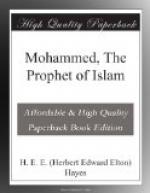But the benefits of the revenue accruing led him, some
time afterwards, to produce revelations sanctioning
hostilities even in the sacred months. The early
successes provided the community with more wealth
than was needed, and, arousing the avarice of many
of those who were opposed to the prophet, led them
to throw in their lot with him. Having seared
his conscience by acknowledging the righteousness of
the robber policy, it was easy for him to persuade
himself that it was all part of the purpose of God
to prosper his claims. All who would not acknowledge
him were the enemies of God, and had no rights to property
or to life. He began to preach the holiness of
war against all unbelievers. He fanned the avaricious
fanaticism of his followers into a flame of religious
enthusiasm, and they became soldier priests, whose
deaths on the battlefield were glorious martyrdoms,
which gave them immediate entrance into a paradise
where all their inclinations could be indulged to
an unlimited degree. It is not to be wondered
that an army of such men could put three times their
number of Meccans not so inspired to flight.
This is what actually happened in the battle of Badr.
Mohammed had received news of the possibility of capturing
a particularly rich Meccan caravan, and decided to
make the attempt. News of his plans reached the
Meccans, who determined to frustrate, if possible,
the designs of their enemy. A thousand men were
rapidly organised into a defensive and punitive force,
and sent out to overwhelm the three hundred Moslems.
They were by no means skilled in military strategy,
little better than a disorderly horde; whereas the
Moslems, under the masterly guidance of Mohammed, seem
to have exhibited clever organisation. It has
been said that the rigid prayer ritual enforced by
Mohammed, at the risk of Divine punishment, had a
disciplinary effect, and produced results very similar
to those obtained by military drill. The Meccan
host was put to flight, discipline, and steadfastness
of purpose determined the victory. The Moslems
returned to Medinah, carrying in triumph many prisoners,
and considerable booty. The revelation produced
after this, speaks of it as the “Day of deliverance,”
and Mohammed rejoices because the stigma of powerlessness
to show evidence of miracle in his life, is removed,
for he accounts for the victory by direct intervention
of God in his favour. The effect of the victory
on the surrounding tribes was highly favourable to
the prophet. Many of the chiefs sought to ally
themselves to him, but he received their offers solely
on condition that they would embrace Islam. Few
accepted, and those who did not before long regretted
it.




